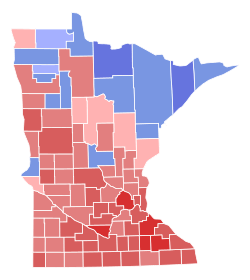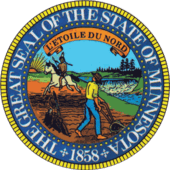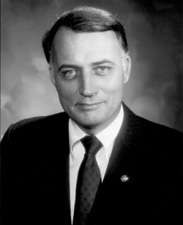1978 United States Senate special election in Minnesota
The 1978 United States Senate special election in Minnesota was held on November 7, 1978. Democratic candidate Bob Short was defeated by Republican candidate David Durenberger.
| |||||||||||||||||
| |||||||||||||||||
 County results | |||||||||||||||||
| |||||||||||||||||
| Elections in Minnesota | ||||||||||
|---|---|---|---|---|---|---|---|---|---|---|
 | ||||||||||
|
||||||||||
|
State executive elections
|
||||||||||
|
||||||||||
Race Description
In 1978, all three key statewide races in Minnesota were up for election—the Governorship, and both Senate Seats (the other Senate seat belonged to Wendell Anderson, who, as Governor of Minnesota, appointed himself to fill the seat vacated by Walter Mondale, when Mondale ascended to the Vice Presidency in 1976). But, there was a particular oddity to the three races—all three had incumbents who were never elected to the office in the first place. This became a well played issue by the Republicans—a billboard put up across the state read, "The DFL is going to face something scary -- an election".
When Hubert H. Humphrey died in office in January 1978, sitting Governor Rudy Perpich appointed Humphrey's widow, Muriel to sit until a special election could be held later that year. However, Muriel Humphrey opted not to seek election to the seat in her own right, and the DFL nominated former Texas Rangers owner Bob Short to run in the subsequent special election. The Independent-Republicans, on their part, nominated the liberal Republican David Durenberger, creating an unusual race in which the DFL candidate was positioned to the right of the Independent-Republican candidate. In addition to the general sense of dissatisfaction voters felt for the DFL, the DFL also had to contend with a large number of liberal members of the DFL, who were dissatisfied with Short's positions on hot button issues such as abortion, motorboat usage in the Boundary Waters Canoe area, and government spending, crossing party lines to vote for Durenberger. As a result, Durenberger won in a 26.9-percent landslide as the governorship and both U.S. Senate seats switched into Republican hands.
Democratic–Farmer–Labor primary
Candidates
Declared
- Sharon Anderson
- Donald M. Fraser, United States Representative from Minnesota's 5th congressional district
- Richard A. Palmer
- Bob Short, Businessman and former owner of the Texas Rangers
Results
| Party | Candidate | Votes | % | |
|---|---|---|---|---|
| Democratic (DFL) | Bob Short | 257,289 | 48.0% | |
| Democratic (DFL) | Donald M. Fraser | 253,818 | 47.4% | |
| Democratic (DFL) | Sharon Anderson | 16,094 | 3.0% | |
| Democratic (DFL) | Richard A. Palmer | 8,425 | 1.6% | |
| Total votes | 535,626 | 100.0% | ||
Independent-Republican primary
Candidates
Declared
- Adell H. Campbell
- David Durenberger
- Will Lundquist
- Malcolm Moos, Former President of the University of Minnesota
- Ken Nordstrom
Results
| Party | Candidate | Votes | % | |
|---|---|---|---|---|
| Independent-Republican | David Durenberger | 139,187 | 67.3% | |
| Independent-Republican | Malcolm Moos | 32,314 | 15.6% | |
| Independent-Republican | Ken Nordstrom | 14,635 | 7.1% | |
| Independent-Republican | Will Lundquist | 12,261 | 5.9% | |
| Independent-Republican | Adell H. Campbell | 8,523 | 4.1% | |
| Total votes | 206,920 | 100.0% | ||
American Party primary
Candidates
Declared
- Paul Helm
Special election
Results
| Party | Candidate | Votes | % | |
|---|---|---|---|---|
| Independent-Republican | David Durenberger | 957,908 | 61.47% | |
| Democratic (DFL) | Bob Short | 538,675 | 34.57% | |
| American | Paul Helm | 45,402 | 2.91% | |
| Socialist Workers | Christine Frank | 11,397 | 0.73% | |
| Libertarian | Frederick Hewitt | 4,116 | 0.26% | |
| Others | Write-ins | 878 | 0.06% | |
| Total votes | 1,558,376 | 100.0% | ||
| Majority | 399,233 | 25.62% | ||
| Turnout | 1,558,376 | 62.06 | ||
| Independent-Republican gain from Democratic (DFL) | ||||
See also
- United States Senate elections, 1978

.jpg)